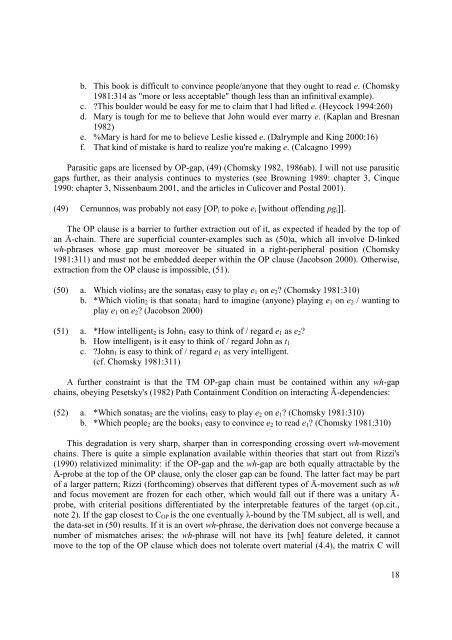1 On tough-movement* Milan Rezac, University ... - Multimania.co.uk
1 On tough-movement* Milan Rezac, University ... - Multimania.co.uk
1 On tough-movement* Milan Rezac, University ... - Multimania.co.uk
You also want an ePaper? Increase the reach of your titles
YUMPU automatically turns print PDFs into web optimized ePapers that Google loves.
. This book is difficult to <strong>co</strong>nvince people/anyone that they ought to read e. (Chomsky<br />
1981:314 as "more or less acceptable" though less than an infinitival example).<br />
c. ?This boulder would be easy for me to claim that I had lifted e. (Hey<strong>co</strong>ck 1994:260)<br />
d. Mary is <strong>tough</strong> for me to believe that John would ever marry e. (Kaplan and Bresnan<br />
1982)<br />
e. %Mary is hard for me to believe Leslie kissed e. (Dalrymple and King 2000:16)<br />
f. That kind of mistake is hard to realize you're making e. (Calcagno 1999)<br />
Parasitic gaps are licensed by OP-gap, (49) (Chomsky 1982, 1986ab). I will not use parasitic<br />
gaps further, as their analysis <strong>co</strong>ntinues to mysteries (see Browning 1989: chapter 3, Cinque<br />
1990: chapter 3, Nissenbaum 2001, and the articles in Culi<strong>co</strong>ver and Postal 2001).<br />
(49) Cernunnos i was probably not easy [OP i to poke e i [without offending pg i ]].<br />
The OP clause is a barrier to further extraction out of it, as expected if headed by the top of<br />
an Ā-chain. There are superficial <strong>co</strong>unter-examples such as (50)a, which all involve D-linked<br />
wh-phrases whose gap must moreover be situated in a right-peripheral position (Chomsky<br />
1981:311) and must not be embedded deeper within the OP clause (Ja<strong>co</strong>bson 2000). Otherwise,<br />
extraction from the OP clause is impossible, (51).<br />
(50) a. Which violins 2 are the sonatas 1 easy to play e 1 on e 2 ? (Chomsky 1981:310)<br />
b. *Which violin 2 is that sonata 1 hard to imagine (anyone) playing e 1 on e 2 / wanting to<br />
play e 1 on e 2 ? (Ja<strong>co</strong>bson 2000)<br />
(51) a. *How intelligent 2 is John 1 easy to think of / regard e 1 as e 2 ?<br />
b. How intelligent 1 is it easy to think of / regard John as t 1<br />
c. ?John 1 is easy to think of / regard e 1 as very intelligent.<br />
(cf. Chomsky 1981:311)<br />
A further <strong>co</strong>nstraint is that the TM OP-gap chain must be <strong>co</strong>ntained within any wh-gap<br />
chains, obeying Pesetsky's (1982) Path Containment Condition on interacting Ā-dependencies:<br />
(52) a. *Which sonatas 2 are the violins 1 easy to play e 2 on e 1 ? (Chomsky 1981:310)<br />
b. *Which people 2 are the books 1 easy to <strong>co</strong>nvince e 2 to read e 1 ? (Chomsky 1981:310)<br />
This degradation is very sharp, sharper than in <strong>co</strong>rresponding crossing overt wh-movement<br />
chains. There is quite a simple explanation available within theories that start out from Rizzi's<br />
(1990) relativized minimality: if the OP-gap and the wh-gap are both equally attractable by the<br />
Ā-probe at the top of the OP clause, only the closer gap can be found. The latter fact may be part<br />
of a larger pattern; Rizzi (forth<strong>co</strong>ming) observes that different types of Ā-movement such as wh<br />
and focus movement are frozen for each other, which would fall out if there was a unitary Ā-<br />
probe, with criterial positions differentiated by the interpretable features of the target (op.cit.,<br />
note 2). If the gap closest to C OP is the one eventually λ-bound by the TM subject, all is well, and<br />
the data-set in (50) results. If it is an overt wh-phrase, the derivation does not <strong>co</strong>nverge because a<br />
number of mismatches arises: the wh-phrase will not have its [wh] feature deleted, it cannot<br />
move to the top of the OP clause which does not tolerate overt material (4.4), the matrix C will<br />
18
















